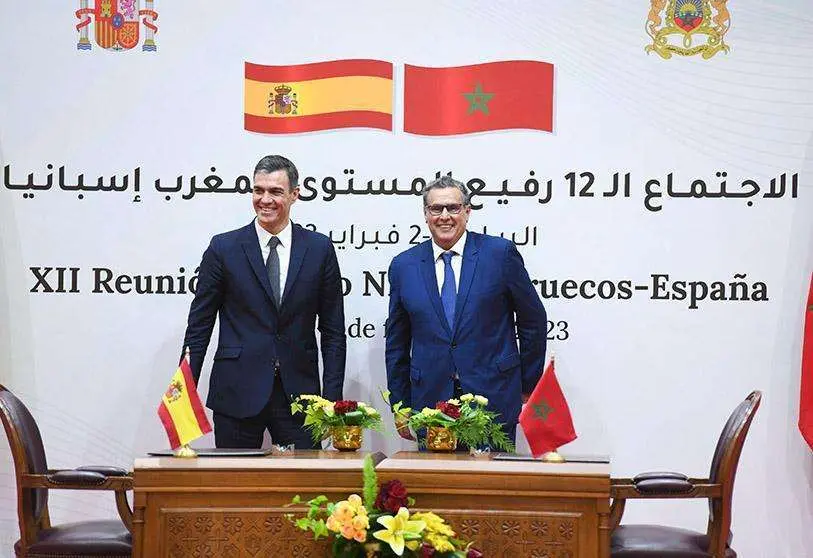Summit with Morocco deepens rift in Spanish government

The Spanish President of the Government, Pedro Sánchez, was aware that the summit with Morocco (12th High Level Meeting), which has already taken place, could increase the divergences within the coalition government. The success or failure of the summit depended on whether the head of the Spanish government would emerge victorious and be able to lead the new phase of Spanish-Moroccan bilateral relations on his own merit, or whether he would otherwise be left with his head cut off. The summit fell by the wayside, among other factors due to the internal crisis within the government itself, which has offered neither confidence nor guarantees to Moroccan interlocutors.
To the already well-known anti-Moroccan stance of the PSOE's populist partner in the government, Podemos-Izquierda Unida, which has adopted as its position of principle the rejection of the Alaouite monarchy and personally of King Mohammed VI, to whom it attributes all the ills that have been and will be done, must be added the boycott from within the state administration and the government itself of the historic project of the Strait Tunnel.
The populist sector of the government coalition had already adopted its position before the HLM took place on 1 and 2 February in Rabat. It had to be criticised. The level of condemnation would depend on whether Sánchez and his ministerial team returned to Madrid with tangible results, contracts, signed agreements, clear statements and commitments. If this was not the case, the populist wing's underground networks would stir up their supporters, condemn - once again - the government for selling the Sahara at a bargain price, and shake up the president whom they accuse of thinking only of future elections. This does not prevent this same populist sector from making the most of their posts, sucking at the state wheel and abandoning their own and strangers by persisting in staying in the Executive despite disagreeing on the main issues of Spanish politics, the Constitution, the war on businessmen, the role of the banks, the Sahara issue, the war in Ukraine or NATO.
However, the most serious thing has happened within the socialist sector of the government and the administration itself. There is no doubt, and this is attested to by the main national and foreign media, including, of course, the Moroccan media, that the reactivation of the Tunnel under the Strait project was the most important success of the summit. And that is because the project is already underway. Prior to the HLM, several bilateral meetings were held in January. The president of the Spanish body in charge of the project, SECEGSA, José Luis Goberna Caride, the young major general with extensive experience in the General Staff and NATO relations who conceived the Emergency Military Unit, held several meetings in Rabat with his Moroccan counterpart Abdelkabir Zahoud and the minister of guardianship, Nizar Baraka, which resulted in the decision to convene the Joint Intergovernmental Commission, which had not met for 14 years, prior to the HLM. The Spanish Minister of Transport, Raquel Sánchez, and the Moroccan Minister of Equipment and Water Resources, Nizar Baraka, led the Joint Commission by videoconference, with a rapprochement of points of view and concrete plans that had never been achieved before.
Following the success of the Joint Commission and in anticipation of the meetings to be held in Rabat on the occasion of the HLM, a five-line paragraph was drafted highlighting the success achieved between the two parties on the historic Strait Tunnel project, destined to be included in the final Declaration of the HLM. The project of strategic scope, which enjoys the personal support of Morocco's King Mohamed VI and Spanish President Pedro Sánchez, was to be appreciated as one of the most important historic achievements of the new phase of relations.
However, in the HLM's final declaration, there is no mention of it. The Ministry of Foreign Affairs is responsible, on the Spanish side, for drafting the text of the Declaration that is submitted to the Moroccan side. And in the Declaration, to the great surprise of the Moroccan side, there was no mention of the Tunnel, despite the fact that those responsible for the final drafting had in their possession the five-line paragraph drawn up after the success of the Joint Commission. This has been seen in some specialised media as a boycott, a self-interested obstruction of a project destined to generate thousands of jobs, mobilise European and international companies and capital, and raise Spanish-Moroccan relations to an exemplary level of strategic partnership.
The boycott has been so crude that the Spanish minister Raquel Sánchez, on her own initiative or at the suggestion of La Moncloa, has come out in various press statements to highlight the achievements of both governments in this project. If the minister had not made these statements, the issue would have remained in a drawer, on hold.
This image of governmental fracture is perhaps more serious than that of the heteroclite coalition itself, because if the latter reflects Spanish-Spanish quarrels, the former reflects the interests of third countries that do not want Spain to lead the Euro-African relationship through the strategic link between Madrid and Rabat.

